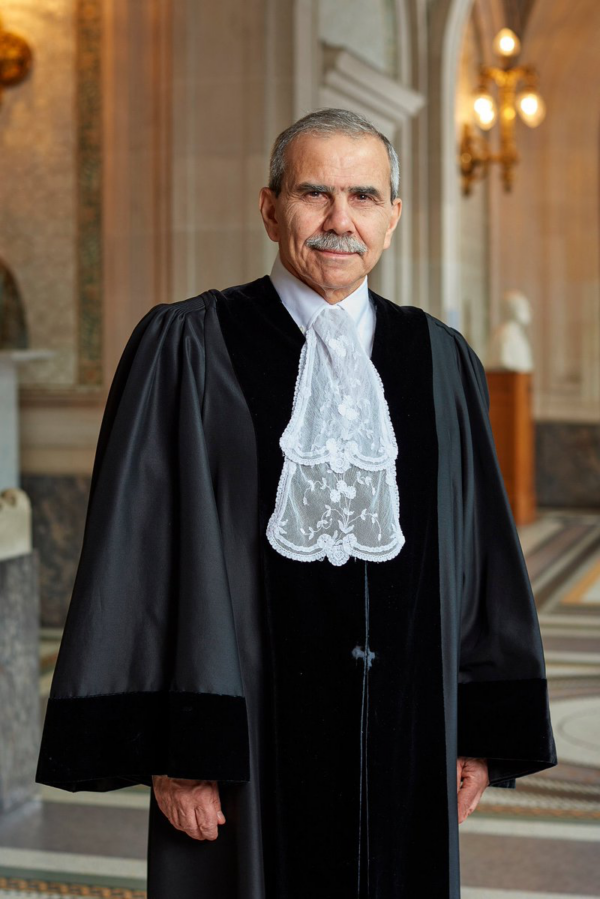Former Lebanese ambassador to the UN was elected on Tuesday as President of the international Court of Justice for a three-year term.
Judge Salam, who has been a member of the ICJ since 2018, called his election a “major responsibility in achieving international justice and upholding international law”.
Calls on the Lebanese to return to the rules of law
“The first thing that also comes to my mind at this moment is my constant concern for my city, Beirut, to return to the laws, as is its title, and for us to succeed as Lebanese in establishing the rule of law in our country and for justice to prevail among its people,” he said.
Judge Salam has been repeatedly considered as a possible contender for Lebanon’s prime minister position , but his candidacy faced obstacles from the Iran-backed Hezbollah militant group . In 2023 he was proposed by the French government as the new Prime Minister along with Hezbollah candidate Suleiman Franjieh as the new president. Hezbollah supported the French proposal but the opposition rejected it since the PM has to be selected by the Parliament.
His election was welcomed by many Lebanese officials and professionals
Son of Abdallah Salam and Reckat Beyhum, Nawaf was born into a prominent family from Beirut, Lebanon. His grandfather, Salim Salam, the leader of the “Beirut Reform Movement”, was elected deputy of Beirut to the Ottoman parliament in 1912. His uncle, Saeb Salam, fought for Lebanon’s independence from the French Mandate of Lebanon and subsequently served four times as Prime Minister of Lebanon between 1952 and 1973. His cousin Tammam Salam was also Prime Minister of Lebanon between 2014 and 2016.
Salam received a doctorate in political science from the Institut d’Études Politiques de Paris (Sciences Po) an LLM from Harvard Law School (1991), a doctorate in history from Sorbonne University(1979), and a Diploma from the Ecole des Hautes Etudes en Sciences Sociales (1974)
From 1979 to 1981, Judge Salam was a lecturer on the contemporary history of the Middle East at Sorbonne University. In 1981, he left Paris to spend an academic year as a visiting scholar at the Weatherhead Center for International Affairs at Harvard University. Between 1985 and 1989, he was a lecturer at the American University of Beirut, during which time he also practiced law as an associate at Takla Law Firm. He was a visiting researcher at Harvard Law School from 1989 to 1990, and a foreign legal consultant at Edwards & Angell LLP from 1989 to 1992. He resumed his practice at the Takla Law Firm in 1992 as well as his teaching of International Law and International Relations at the American University of Beirut. He was appointed Visiting associate professor of Political Science in 2003, and later associate professor of Political Science in 2005. From 2005 to 2006, he was the Chairman of the Political Studies and Public Administration Department.
Salam also served as a member of the Executive Bureau of the Economic and Social Council of Lebanon from 1999 to 2002 ]and as a member of the Lebanese National Commission of UNESCO from 2000 to 2004. In 2005 and 2006, he was a member and Secretary General of The National Commission on Electoral Reform which was entrusted with the task of preparing the draft of a new electoral law for Lebanon. He has also served on the board of trustees of the Lebanese Center for Policy Studies (LCPS), a non-partisan think tank whose mission is to produce and advocate policies that improve governance in Lebanon and the Arab world. In 1996, he co-founded the Lebanese Association for Democratic Elections (LADE), a non-governmental monitoring organization that works to promote the fair and transparent conduct of parliamentary and municipal elections.
In May 2010 and September 2011, he held the rotating Presidency of the UN Security Council.
in 2012 Judge Salam was awarded the French Legion of Honour (Légion d’honneur) at the rank of Officer (Officier) by President Nicolas Sarkozy.
Salam has written several books and articles on political and constitutional reform, electoral law reform, overcoming sectarianism, and fighting corruption and promoting accountability through strengthening the independence of the judiciary and the rule of law. He has also written on the question of citizenship and civil society in the Arab world as well as on the development of international law.
Judge Julia Sebutinde (Uganda) was elected on Tuesday as
Vice-President of the International Court of Justice by her peers, for a term of three years, ICJ announced in a press release. Judge Sebutinde has been a Member of the Court since February 6 , 2012


Leave a Reply
You must be logged in to post a comment.